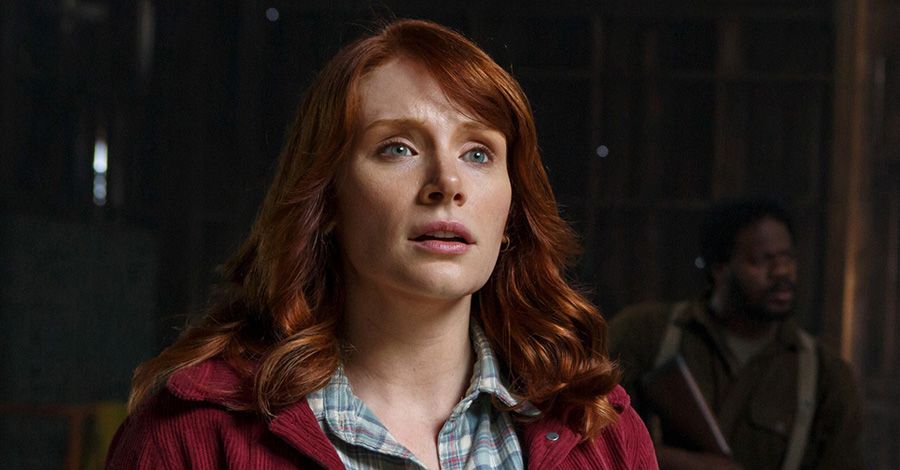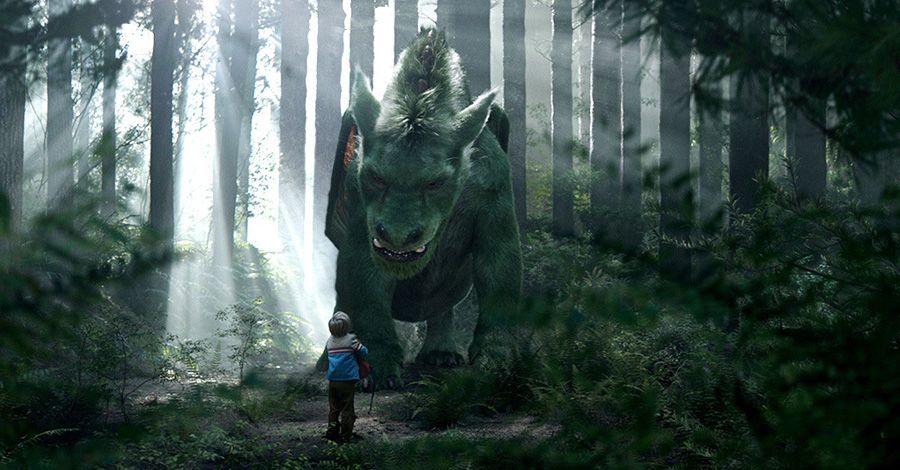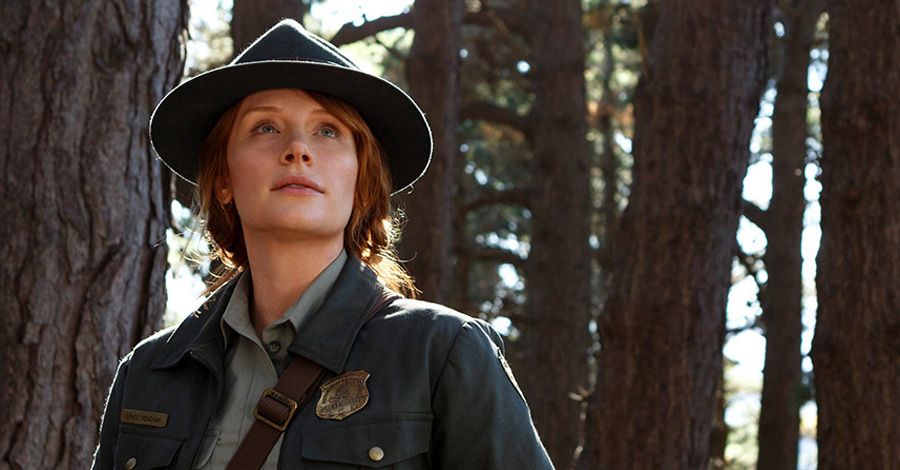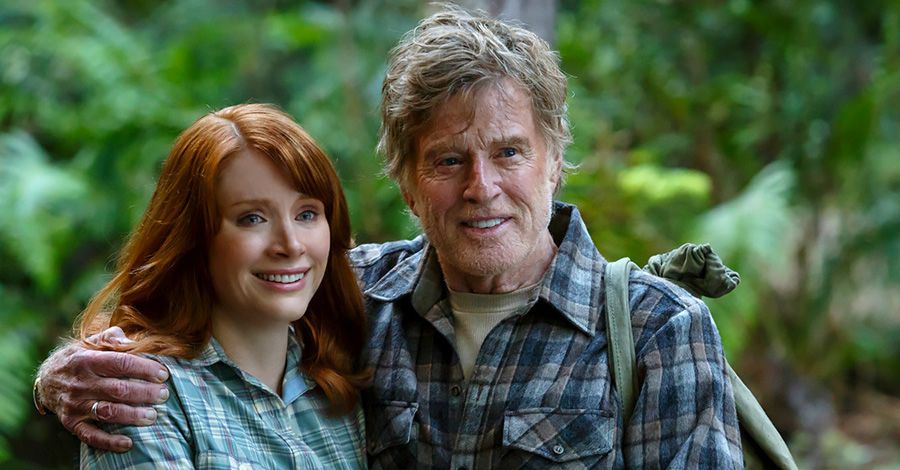Bryce Dallas Howard admits she’s getting pretty comfortable acting opposite enormous creatures that haven’t walked the planet in recorded history.
After sharing the screen with digitally created dinosaurs in the blockbuster “Jurassic World,” the actress now co-stars with a surprisingly shaggy CG incarnation of a mythical beast for “Pete’s Dragon,” a dramatically different and more emotionally hefty take on the 1977 Disney classic. The new film, which opens Friday nationwide, is cut from cinematic cloth gathered more from “E.T. the Extraterrestrial” than the original musical.
Howard, who grew up enraptured with the original film while also very aware of its source material’s inherent oddness, joined journalists to reflect on myriad topics, from how her love of the 1977 film led her to seek out a role in the re-imagining, to her take as a parent on the importance of tragic elements in the Disney lexicon.
You make a movie in your head when you’re shooting a movie, but when you see a finished product – especially one like this that has got so many elements that are added afterwards – it can be very different. Give us that first take that you had.
Bryce Dallas Howard: It’s so crazy, because it plays tricks a little bit on your memory when you do a scene and then there’s nothing there but you’re imagining something. And they showed us versions of what Elliott was going to be like and there had been a little screening of Elliott being adorable and all of that.
So I had a sense in my mind’s eye of what I was looking at, but then when I saw the movie, all of a sudden I see what was really there. But now when I remember back on doing the scene, it’s like as if he was really there doing it! It’s the weirdest thing. It’s like a sleight of hand thing that happens in your brain and suddenly everything that wasn’t real is real.
But I would say – and I’ve had this experience a couple of times now with reptiles that start with the letter D, for both “Jurassic World” and for “Pete’s Dragon” – we were prepared. They brought the actors in and showed us what everything was going to look like and what the plans were for each shot and so it wasn’t such a surprise. It wasn’t like “Oh, that’s what we were shooting.”
And I think that’s something I’m grateful for obviously because it’s really tough to do things without any context or sense, to be like “What am I looking at?” So they did a really good job preparing us.
Your father was a child actor. You missed that experience, but you’re working here with child actors, how do you feel about them? Are you protective of them?
Very much so, for sure. I really love working with kids because I find it to be, I shouldn’t say easier, because it’s not like in comparison to adults, but it’s a very natural experience working with kids and playing with kids and pretending with kids because that’s their normal state; like when we were all kids running around pretending that we’re being chased by one thing or another or flying on something.
With my children, the moment I say “Let’s pretend there’s hot lava,” they’re there instantly and it’s real hot lava and it’s intense! So I think it’s that sort of experience working with Oakes [Fegley] and Oona [Laurence], any child on a set, it’s easy to pretend and it makes it more fun for the adults. It keeps things lighter and of course, God forbid if someone swears in front of a child, I’d go “Um, hmm ...”
But these kids have really incredible parents and that also makes a huge difference and I obviously learned that from my dad as well with my grandparents and everything. That’s a huge part of working with kids is also getting to know their parents and having them feel like they can trust you because you’re going to be the person on set with their child.
If your kids wanted to pursue acting, would you be worried? Would you set boundaries? Would you be all for it?
My son was an extra in “Jurassic World” and in “Pete’s Dragon.” He said to me, “Next time I’d like to be the lead.” And I said, “Well, if you study very hard and you go to school and you audition a lot and you get a role, there’s a chance you might be able to be the lead of something.” And he said, “How old do I need to be?” And I said, “You’d need to be over 18.”
So then I went to his school one day and his friends were all asking me questions about “Jurassic World.” It was funny, he was in the background with his shy smile, and then I felt bad because he was the only kid out of the entire group who hadn’t seen “Jurassic World.” They were asking me all these questions and then they said, “Theo said that he’s going to be the lead when he’s 20.” So he has concocted this idea that it’s an age thing. You can honestly never say never, but it would probably be unlikely for my kids to be professional actors as young kids.
Was it hard or easy for you to announce to Ron Howard, “This is what I want to do with my life?” With acting, when you told him this is what I’m going to do.
Not hard, because he didn’t have a say in the matter because I didn’t need permission or anything. Basically I was saying to them, “I’m going to go to school and I’m interested in studying these things and this is what I’m pursuing,” and they said “Great – hope it works.”
I knew from a young age that I was going to need – and my siblings for that matter, we knew that we were always going to need to support ourselves. There wasn’t a trust fund, he wasn’t going to pick up the phone and make a phone call, and if he did that would probably hurt more than help. So it wasn’t a difficult conversation because also I had seen my family, for the most part, have really positive associations to being actors, or directors, writers or producers, and so I knew that he was going to be disappointed.
Had you seen the original 1977 film before you did this?
Oh, yes!
When you heard about this project coming along, did you think, “I’m going to need to learn how to sing at a lighthouse?” Or did you know it was going to be something completely different?
The way I found out about this was I heard that there was a "Pete’s Dragon," and I’m a sort of sleuth, so I thought what are they going to do, because I loved “Pete’s Dragon” as a kid. When I told my sister that I was doing “Pete’s Dragon,” she cried. I said, “Wait, no – it’s so different. How am I going to explain this to you?”
I heard that it was happening, and I was really curious as to what they were going to do, how they were going to adapt it because it’s an unusual film. It really is unusual. Then I saw that apart from the title and the essential themes and the characters of Pete and Elliott, it was truly a departure and yet something that I thought was so beautiful. That’s when I thought I’d really love to be in this and tried to be in it. And it worked out.
Your director David Lowery mentioned that he feels that this film also allows children to explore being a little bit uncomfortable, a little bit scared. Can you talk to that from the view point of a mother and also as someone working in film?
Yes, absolutely. It’s so interesting because the emotions of particularly early Disney films are really deep and heavy. Parents are always dying; that’s the greatest fear of a child that that is going to happen; or that you’ll get lost. Basically it’s the scariest thing.
And yet Disney has this history of making movies where the central characters are young people who are faced with the worst possible situation and yet are able to move through it and not just survive, but find themselves because of that and in the case of Pete’s Dragon, this is a movie about what it takes to find your family when you think you’ve lost your family.
So I think that these stories actually play a role in our society that is of service to children and I think it’s up to every parent to assess where their kids are at in terms of sensitivity levels and ask, “Is my child going to be ready to [see it]?”
For years with my son I would play “Bambi” but fast forward past the “mother” part or the big fight or the fire. And then there came a day where I said we’re going to watch all of “Bambi” and we’re going to talk about this. So I think in a way these Disney movies in particular can be very healing and very therapeutic.
From a historical standpoint, if we think back to the caveman, the purpose of storytelling is to tell a story, for example, about a poisonous thing that I saw that killed my friend, then this happened, but then I ran there and I survived, so if you stumble upon this poisonous thing, let’s say a snake, you’re going to run away because you heard that story.
So stories are there to prepare us, to prime us for real trauma, for real survival situations, for real heartbreak. Movies and novels and even just spoken stories, they are there to help us manage our feelings so that when we are faced with these situations in real life, we can hopefully tolerate our feelings a little bit better.
How did your own protective feelings for the young actors informed your character, who also immediately forms a connection with Pete and feels the need to protect him but even takes a step further than that and she’s really ready to be the mother he never had since he was originally lost in the forest.
I think that’s who Grace is. She’s there to initially protect the forest, that’s her role as forest ranger – first and foremost it’s her responsibility to preserve the planet. I think that really shifts beautifully to when she sees Pete and takes on a very maternal role with him. That was just being a parent – I’m sure those of you who are parents, that’s the first thing, that kid is born and you’re the protector! It came pretty naturally.
It’s a big-budget movie, it’s a remake of the original which you were familiar with and then you come into this --
Re-imagining, re-something … please help us with that, because it’s complicated!
This fantasy movie is about a dragon, but then at its heart its extremely centered around the emotions … There’s so much emotion in it that overrides a lot of the fantasy elements. Were you surprised when you came into the project that it went so much in that direction and wasn’t more of just a pure fantasy?
I think that’s what drew me to it initially. Then when I saw that David was the director, he is just such an emotional director and a sensitive director, and he has a quietness that he brings to everything. I’d read the script, and knowing that it was David, I knew that it was going to be something that was different.
Honestly I was surprised how emotional it was. Two days ago, right from the beginning – I guess because I’m a parent – I turned to my husband five minutes in and I said, “Is this OK?” and he said, “Not for me it’s not.” It’s really gets you. And that’s a very good thing, but it is intense.
There’s a sage quality about Robert Redford, both in the film and in life. What were the lessons you took away either directly from him or just from observing him?
That great people can do extraordinary things. He is one of the greatest entertainment entrepreneurs in history. What he did with Sundance was paradigm shifting and on top of that he’s one of the greatest actors, filmmakers, producers of all time.
Who he is as person: he’s highly intelligent, very evolved; but at its essence he’s a really cool guy who’s game to tell stories. We always think of these icons as these rarefied individuals and it’s wonderful to get to spend time with them and see they’re people trying to do things, trying to live their life and make something of their life. Sometimes you end up a Robert Redford! It’s inspiring, it really is inspiring.




